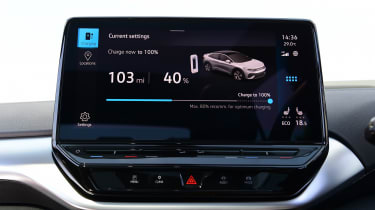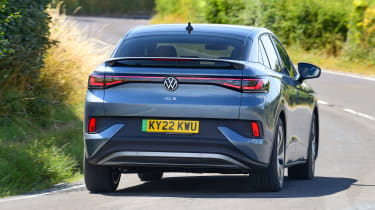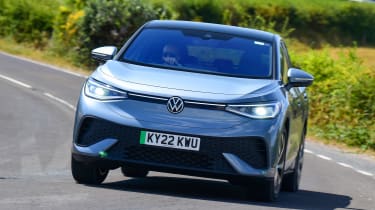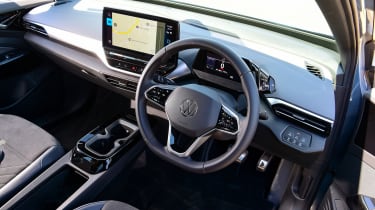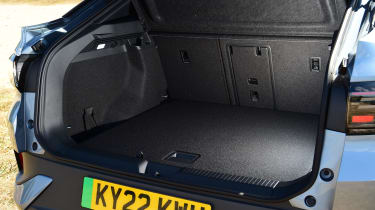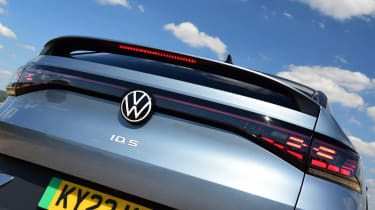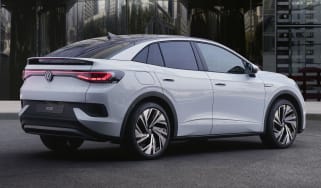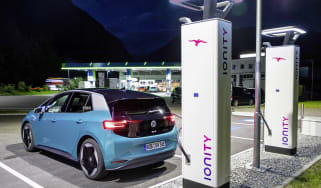Volkswagen ID.5 review
Like a Toni & Guy haircut, the Volkswagen ID.5 is certainly stylish, but you can get the same cheaper elsewhere
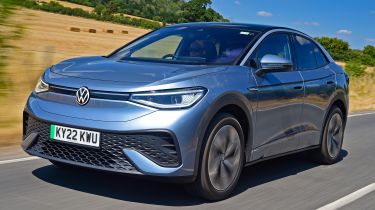
Pros
- Smart looks
- Decent range
- No big practicality sacrifice
Cons
- Average charging speed
- Not brilliant to drive
- Quite pricey
| Car type | Range | Wallbox charge time | Rapid charge time |
|---|---|---|---|
| Electric | 327 miles | 12hrs 15mins (0-100%, 7.4kW) | 33mins (10-80%, 135kW) |
Volkswagen ID.5 verdict
The Volkswagen ID.5 is perhaps the weakest link in VW’s growing lineup of electric cars. Costing roughly £5,000 more than the equivalent Tesla Model Y, the ID.5’s cheap-feeling interior and relatively gutless powertrains do little to live up to its premium price.
It’s not without its merits, though; the Volkswagen ID.5 boasts a strong range figure that’s easy to achieve in normal driving. Despite the sloping roofline, it isn’t much less practical than the ID.4 SUV, either. Regardless, we think there are better options out there at this price point, with the Skoda Enyaq Coupe offering even more space and a plusher interior for less.
Details, specs and alternatives
Simply put: the Volkswagen ID.5 is essentially a sleeker version of the rather blob-shaped Volkswagen ID.4. Sitting above the ID.3 hatchback and below the ID.7 saloon in the lineup, the ID.5 acts as a rival for other electric coupe-SUVs such as the Genesis GV60, Volvo C40, Skoda Enyaq Coupe and Audi Q4 Sportback e-tron – with the latter two sharing their underpinnings with the VW.
While the ID.4 is available with two battery sizes, ID.5 buyers are stuck with the larger 77kWh unit. This is available with Pro, Pro Performance and high-performance GTX powertrains; the former produces 172bhp from its single electric motor, gets from 0-62mph in 10.2 seconds and has a claimed range of up to 327 miles.
The Pro Performance, as its name suggests, provides a bit more poke; with 201bhp on tap, this will reach 62mph in 8.4 seconds and matches the Pro’s 327-mile range figure. Topping the lineup is the high-performance GTX – we’ve reviewed this model separately. Unlike lesser models in the range that are rear-wheel-drive, the GTX gets two electric motors for four-wheel-drive and a combined output of 295bhp, with the sprint to 62mph taking a little over six seconds.
As for the Pro and Pro Performance models, both are available in Style and Tech trim levels. Standard equipment is strong, even on the base Style car. All ID.5 models get Matrix LED headlights, a 12-inch infotainment touchscreen with sat nav, Apple CarPlay and Android Auto connectivity, tri-zone climate control, a wireless smartphone charger, a panoramic sunroof, a reversing camera and a host of other driver aids.
Stepping up to Tech trim adds electric front seats, a 360-degree camera, a powered bootlid and a head-up display. Doing so costs around £3,500, so we recommend sticking with the base Style specification as this contains almost everything most drivers will need. It’s just a shame that you have to pay an extra £1,000 for an energy-efficient heat pump – this is designed to help take the strain off the air conditioning system in the winter months, helping you to get closer to the car’s official claimed range.
Range, battery & charging
| Range | Wallbox charge time | Rapid charge time |
|---|---|---|
| 327 miles | 12hrs 15mins (0-100%, 7.4kW) | 33mins (10-80%, 135kW) |
As mentioned, the Volkswagen ID.4 is only available with one battery configuration: a 77kWh unit that provides a range of up to 327 miles in both the Pro and Pro Performance models. Strangely, this is slightly less range than what’s possible in the equivalent Volkswagen ID.4, despite the ID.5’s slipperier shape.
Nevertheless, a range of over 300 miles is not something to sniff at, and we actually found that it is fairly easy to get close to that figure. During our time driving the Volkswagen ID.5, we achieved an impressive 3.9 miles per kWh, translating to a range of bang-on 300 miles. Without a journalist’s heavy right foot and in decent weather, we suspect it’s more than possible to match VW’s 327-mile claim.
Of course, you’ll also need to charge the ID.5 whenever it starts to run low; all models get 135kW rapid charging capabilities as standard, with a 10-80% charge taking roughly half-an-hour when the car is connected to a compatible public charger. While this may sound impressive, it’s actually pretty average for this class of car – in comparison, the rival Kia EV6 can charge at speeds of up to 233kW, meaning the same 10-80% top-up will take just 18 minutes.
If you’re charging at home using a standard 7.4kW wallbox, you can expect to fully charge the ID.5’s big batteries in around 12 hours. Those in a pinch can use a standard three-pin plug, although you can expect to be sitting around for about a day and a half.
Running costs & insurance
Starting at over £50,000, the Volkswagen ID.5 is far from a “people’s car”. However, that’s not to say it shouldn’t be relatively inexpensive to run – especially for company car drivers. Like all EVs, the ID.5 slots into the ultra-low 2% Benefit-in-Kind bracket, meaning those using it as a company car will be paying as little as £203 per year in tax. That’s not even mentioning road tax (VED) which all electric cars, the ID.5 included, are exempt from until 2025.
Insuring the ID.5 shouldn’t bankrupt you either; Pro and Pro Performance versions of the coupe-SUV span groups 27-30, depending on exact specification. Compare this to the Tesla Model Y which sits in groups 45-50 and the ID.5 looks relatively cheap to cover in comparison. That is, unless you go for the GTX model which sits in the relatively high group 38 out of 50.
Performance, motor & drive
| Model | 0-62mph | Top speed | Power |
|---|---|---|---|
| Pro | 10.2s | 99mph | 172bhp |
| Pro Performance | 8.3s | 99mph | 201bhp |
You’d be forgiven for thinking the Volkswagen ID.5 offered a sporty drive, not least because of its swoopy styling and electric powertrain. However, the figures tell a bit of a different story; the entry-level Pro powertrain only produces 172bhp, which isn’t really sufficient for a car weighing over two tonnes. Thus, the sprint from 0-62mph takes over ten seconds, with the car feeling rather sluggish in practice, not offering anywhere near the same ‘kick in the back’ we’ve all come to expect of EV acceleration.
We recommend stepping up to the Pro Performance powertrain as you’ll be grateful for the extra power on offer, which, thankfully, doesn’t come at the expense of range. While 201bhp still isn’t quite what you’d get in, say, a Tesla Model Y or even a Nissan Ariya, the ID.5 Pro Performance still reaches 62mph in an adequate, if not exhilarating 8.4 seconds.
Regardless, both powertrains offer smooth acceleration and are virtually silent when on the move. The ID.5’s suspension does well at soaking up bumps and this, combined with its 300+ mile range, makes it an ideal motorway cruiser.
On the other hand, for what is supposed to be a sportier version of the ID.4 SUV, the ID.5 coupe isn’t particularly inspiring to drive on a twisty road. Accurate, yet light steering is matched by an unwanted amount of body roll in the corners, meaning you’re almost urged to drive the ID.5 at a relaxed pace. If you want an electric family car that’s fun to drive, a Kia EV6 or Ford Mustang Mach-E are your best bets.
Interior, dashboard & infotainment
In recent years, Volkswagen has come to be seen as somewhat of a premium brand, battling it out with the likes of BMW, Mercedes and even VW Group's own, Audi. This premium status is not reflected in the ID.5’s cabin, however; the overall design is smart enough, with the typical minimalist layout you’d find in other electric cars. It’s the material quality that really lets the Volkswagen down, though. There are several scratchy plastics to be found, while the dull black-on-black colour scheme is far from the bright two-tone palette we were promised originally in advertising material.
Like all modern cars, the Volkswagen ID.5’s cabin centres around a large touchscreen on the dashboard; measuring 12 inches in diameter, this runs similar software to what you’d find in the new Volkswagen Golf, albeit in a slightly different form factor, and is partnered with a small five-inch digital instrument cluster.
The system itself is generally quick to respond and performing certain actions such as changing the radio station or plotting a sat nav route are relatively painless. Unfortunately, like other VW systems at the moment, the ID.5’s setup can be rather glitchy at times and will freeze on occasion. We also don’t like the fact that the climate controls come in the form of fiddly touch-sensitive sliders which are difficult to operate while driving and even more so when driving in the dark as they aren't illuminated.
Boot space, seating & practicality
| Length | Width | Height | Boot volume (seats up/down) |
|---|---|---|---|
| 4,599mm | 1,852mm | 1,616mm | 549/1,561 litres |
Choosing a coupe-SUV over a traditional 4x4 usually comes at the expense of passenger and boot space; not so in the ID.5, though, as only if you stack the boot right to the roofline will you start to find any compromises compared to the ID.4. There’s more than enough space for a couple of suitcases or a buggy, with the powered bootlid coming in handy on top-spec Tech models.
Passengers have more space than you might expect, too – those over six foot will be more than comfortable in the back seats, with plenty of head and legroom on offer. Plus, for smaller passengers, there’s also an ISOFIX child seat mounting point in the front seat, as well as the two at the rear.
Reliability & safety rating
So many electric cars have come out over a short period of time recently – the Volkswagen ID.5 included. Therefore, it’s difficult to get any concrete reliability data. What we can say is that electric cars should, in theory, be more reliable than their petrol-powered counterparts thanks to having fewer moving parts. This isn’t entirely reflected by Volkswagen as a brand, though, which could only finish a middling 18th in our 2022 Driver Power customer satisfaction survey, with roughly 18% of respondents reporting a fault with their car within the first year of ownership.
Much better is the ID.5’s Euro NCAP safety rating, with the European crash testers awarding the Volkswagen coupe-SUV the full five stars. This was helped by standard-fit ‘Front Assist’ autonomous emergency braking, as well as lane-keep assist, adaptive cruise control and an electronic speed limiter.

